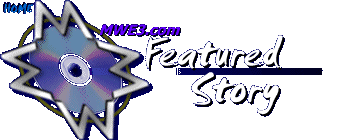Guardian
Angel
The Return
of Hank Marvin
And The Shadows
interview
written and produced by Robert Silverstein of 20th Century Guitar
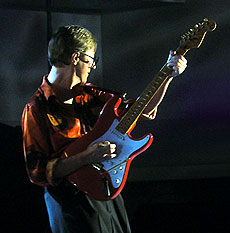 Like
most of the fabled British rock legends from the ‘60s, the story
of The Shadows is much too intricate to fathom in a modest paragraph.
Despite that unenvied curse of never breaking through in the U.S.
with their English and decidedly Euro-centric, melodic-based approach
to instrumental music, guitarists Hank Marvin and Bruce Welch—with
keen support from long time drummer Brian Bennett who joined in 1962—have
through the years, produced and recorded possibly one thousand great
instrumental and vocal tracks. Because their signature song “Apache”—written
for them in 1960 in the back of a tour bus by Jerry Lordan—was
incredulously released Stateside on Atco by a Danish guitarist called
Jorgen Ingman (on the same label no less, take a bow Ahmet!), The
Shadows were completely missed and mismarketed by the American record
moguls, all the while having number one hits in every other country
from Canada to Thailand! Don’t forget, Capitol—the U.S.
division of EMI Records—initially passed on The Beatles, only
to then hurriedly conjure up a frantic (and in retrospect, completely
hilarious) Beatlemania for the U.S., wigs, playing cards, lunch boxes
and all. The key Shads years were between 1959-1964, the same year
of Beatlemania, which more or less sealed the deal on The Shadows
never making an impact in the U.S. Influencing guitarists and the
worldwide music scene much more than they were ever given credit for
especially by the “American market”, the Shads continued
charting everywhere but the U.S., recording one great instrumental
hit after hit single, E.Ps. and albums for EMI, while rubbing shoulders
with The Beatles, John Barry and Vic Flick and the fabled EMI roster
back on Abbey Road. As great as their ‘50s, ‘60s and '70s
works on EMI remain, their ‘80s and ‘90s albums on Polydor
contain some of the finest masterpieces of instrumental guitar pop
recorded during those decades. Although they finally did in fact break
up in 1990, following their ‘90 Polydor CD Reflection, Hank
Marvin and drummer Brian Bennett went on to prominent solo careers
with Hank in particular continuing to release a round of great instrumental
and vocal CDs, dating back to his brilliant 1969 solo debut on EMI.
Now living in Australia, Hank in recent years has recorded a number
of tracks with his son, guitarist Ben Marvin, after previously recording
with Brian Bennett’s son Warren Bennett, who till this day keeps
the Shads instrumental guitar vision alive with his group The Vibratos.
A decision to go back on one last final tour, Hank, Bruce and Brian
have enlisted some great support from long time Shads keyboardist
Cliff Hall and bassist Mark Griffiths, all of which has resulted in
a 2004 CD and DVD called The Final Tour. Documenting their
show in Cardiff on April, 2004, The Final Tour is nothing less
than a revelation and confirmation of The Shadows as musical pioneers
and visionaries. Just about every major British guitarist born in
the ‘40s and ‘50s was greatly impacted by the guitar sound
of Hank Marvin, not to mention the rhythm guitar of Shadows co-founder
Bruce Welch. Whether knowingly or indirectly, The Shadows were the
band that sewed the seeds for all to follow. The Final Tour DVD
features a great hour long interview with Marvin, Welch and Bennett
and serves as a great tribute to the music and that classic sound
that shaped the British pop scene. Music Web Express 3000 and 20th
Century Guitar reviews editor Robert Silverstein spoke with Hank Marvin
by phone from Australia on November 17, 2004.
Like
most of the fabled British rock legends from the ‘60s, the story
of The Shadows is much too intricate to fathom in a modest paragraph.
Despite that unenvied curse of never breaking through in the U.S.
with their English and decidedly Euro-centric, melodic-based approach
to instrumental music, guitarists Hank Marvin and Bruce Welch—with
keen support from long time drummer Brian Bennett who joined in 1962—have
through the years, produced and recorded possibly one thousand great
instrumental and vocal tracks. Because their signature song “Apache”—written
for them in 1960 in the back of a tour bus by Jerry Lordan—was
incredulously released Stateside on Atco by a Danish guitarist called
Jorgen Ingman (on the same label no less, take a bow Ahmet!), The
Shadows were completely missed and mismarketed by the American record
moguls, all the while having number one hits in every other country
from Canada to Thailand! Don’t forget, Capitol—the U.S.
division of EMI Records—initially passed on The Beatles, only
to then hurriedly conjure up a frantic (and in retrospect, completely
hilarious) Beatlemania for the U.S., wigs, playing cards, lunch boxes
and all. The key Shads years were between 1959-1964, the same year
of Beatlemania, which more or less sealed the deal on The Shadows
never making an impact in the U.S. Influencing guitarists and the
worldwide music scene much more than they were ever given credit for
especially by the “American market”, the Shads continued
charting everywhere but the U.S., recording one great instrumental
hit after hit single, E.Ps. and albums for EMI, while rubbing shoulders
with The Beatles, John Barry and Vic Flick and the fabled EMI roster
back on Abbey Road. As great as their ‘50s, ‘60s and '70s
works on EMI remain, their ‘80s and ‘90s albums on Polydor
contain some of the finest masterpieces of instrumental guitar pop
recorded during those decades. Although they finally did in fact break
up in 1990, following their ‘90 Polydor CD Reflection, Hank
Marvin and drummer Brian Bennett went on to prominent solo careers
with Hank in particular continuing to release a round of great instrumental
and vocal CDs, dating back to his brilliant 1969 solo debut on EMI.
Now living in Australia, Hank in recent years has recorded a number
of tracks with his son, guitarist Ben Marvin, after previously recording
with Brian Bennett’s son Warren Bennett, who till this day keeps
the Shads instrumental guitar vision alive with his group The Vibratos.
A decision to go back on one last final tour, Hank, Bruce and Brian
have enlisted some great support from long time Shads keyboardist
Cliff Hall and bassist Mark Griffiths, all of which has resulted in
a 2004 CD and DVD called The Final Tour. Documenting their
show in Cardiff on April, 2004, The Final Tour is nothing less
than a revelation and confirmation of The Shadows as musical pioneers
and visionaries. Just about every major British guitarist born in
the ‘40s and ‘50s was greatly impacted by the guitar sound
of Hank Marvin, not to mention the rhythm guitar of Shadows co-founder
Bruce Welch. Whether knowingly or indirectly, The Shadows were the
band that sewed the seeds for all to follow. The Final Tour DVD
features a great hour long interview with Marvin, Welch and Bennett
and serves as a great tribute to the music and that classic sound
that shaped the British pop scene. Music Web Express 3000 and 20th
Century Guitar reviews editor Robert Silverstein spoke with Hank Marvin
by phone from Australia on November 17, 2004.
HM: Robert. Hallo, how are ya?
RS: Hank, how are you?
HM: I’m well thank you! Well, it’s 8:30 in the morning here
so we’ve got a lovely day outside and that’s something to
look forward to isn’t it?
RS: It’s 7:30 at night here.
HM: Right. Last night. (laughter) From my standpoint. We’re ahead
of our time here, y’know Robert?
RS: You’ve been living in Australia quite a while.
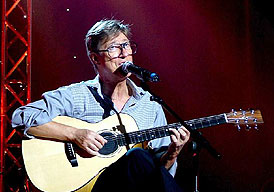 HM:
Well in fact yes, in fact it’s 18 years this month. We live in
Western Australia. It’s a Mediterranean climate which is very
pleasant so you get long, hot, certainly warm summers, dry summers
and you get very mild, wet winters, although unfortunately the way
the climate is changing around the world we’re not getting as
much rain in the winter as we used to, which is beginning to be of
concern of course to whoever you want. Beautiful beaches here Robert,
magnificent beaches, some very good countryside, some excellent vineyards
with some superb wines, both around Perth and the Swan Valley and
further south, in Margaret River and Mt. Barker...places like that.
It’s a beautiful country down south where it’s a little
cooler of course. And it’s a nice place to live because there’s
lots of space, not too many people and it’s a fairly laid back
sort of lifestyle. It’s probably what California was about 50
years ago in terms of the laid back feel and not too many people.
And we enjoy living here. It’s funny, there’s a very good
music scene here, the local music scene is very active, lots of live
bands playing in pubs and hotels and clubs and so forth and bands
of a variety of music disciplines from sort of traditional jazz to
modern jazz, trios, jazz fusion, heavy metal, rock, blues, Cajun,
folk, you name it, it’s there. And it’s a very healthy,
active scene here.
HM:
Well in fact yes, in fact it’s 18 years this month. We live in
Western Australia. It’s a Mediterranean climate which is very
pleasant so you get long, hot, certainly warm summers, dry summers
and you get very mild, wet winters, although unfortunately the way
the climate is changing around the world we’re not getting as
much rain in the winter as we used to, which is beginning to be of
concern of course to whoever you want. Beautiful beaches here Robert,
magnificent beaches, some very good countryside, some excellent vineyards
with some superb wines, both around Perth and the Swan Valley and
further south, in Margaret River and Mt. Barker...places like that.
It’s a beautiful country down south where it’s a little
cooler of course. And it’s a nice place to live because there’s
lots of space, not too many people and it’s a fairly laid back
sort of lifestyle. It’s probably what California was about 50
years ago in terms of the laid back feel and not too many people.
And we enjoy living here. It’s funny, there’s a very good
music scene here, the local music scene is very active, lots of live
bands playing in pubs and hotels and clubs and so forth and bands
of a variety of music disciplines from sort of traditional jazz to
modern jazz, trios, jazz fusion, heavy metal, rock, blues, Cajun,
folk, you name it, it’s there. And it’s a very healthy,
active scene here.
RS: I know Kevin Peek lives down there too, doesn’t he?
HM: Yes. I haven’t seen Kevin in a couple of years. I used to
see him quite frequently but I’m not quite sure what he’s
up to at the moment. As I say, I haven’t been in contact with
him for quite a while.
RS: And Tommy Emmanuel is there too...
HM: Tommy is from the Eastern states but he was living in the U.K.
because he wanted to expand his horizons somewhat. He’d had a
lot of success in Australia and it was natural to try and go further
afield so he went to the U.K. He’s been to the U.S.A. a lot I
understand, hasn’t he? He did something with Chet Atkins.
RS: I saw him last year with Les Paul stompin’ away with his
acoustic.
HM: (laughter) Fantastic! Tommy is a wonderful musician. He really
is. He’s a fantastic player. In fact, he’s back over here
in Perth in December doing a show so I’ll try to link up with
him again. I’ve done a couple of guest appearances with him,
just as a surprise guest, when he’s been in Perth we’ got
up and done a couple of numbers together. It’s always a bit of
fun.
RS: The Final Tour CD and DVD release on Eagle celebrates 45
years of great Shadows recordings and live shows. What were the key
events lead to reforming The Shadows for The Final Tour CD
and DVD?
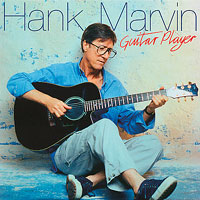 HM:
Yeah, well as you know The Shadows hadn’t worked together since
the end of 1990, you’re probably aware of that Robert. And in
the meantime, I had released a number of albums for Polygram, and
then which became Universal of course in the last few years, and formed
my own band and done tours in the U.K. and in Europe and had quite
a bit of success doing that. And that was a lot of fun because from
my standpoint it gave me less restriction in terms of the approach
to the music. I could do a lot of different things and I decided to
stop touring two and a half years ago basically. I did a final tour
with my band in Europe and the U.K. where we did sixty four concerts
and it was very successful. We had a top ten album with an acoustic
album I did just called Guitar Player. And that was terrific.
And it was just after that, that my manager Brian Goode and myself
had been talking about the possibility of doing something with The
Shadows. I was running hot and cold with it for a while, sometimes
I felt positive about it, sometimes negative, for a variety of reasons.
And then the matter came up again. I think perhaps Brian Bennett and
Bruce had spoken to him about the possibility of it, and he approached
me again and I thought about it. And one of the things that I thought
would be good about us getting together is that, from the standpoint
of the fans, we’ve never done a farewell concert. We just stopped
touring, because of problems within the band at the end of 1990, which
happened to be a very good year for us. We had a platinum album and
a huge sell-out tour, and it was a very successful year anyway. But
because of internal problems—everyone had had enough—we
just stopped. So, from a fan’s point of view there was never
that closure. Well, this is it. It’s, ‘Oh!, what’s
happened, they stopped, they’ve broken up.’ So, I thought
well that’s probably a good idea to do that. Plus, also there’d
been problems in the band, which led to the breakup originally and
subsequently things that had been said, in the press, and intimated
particularly by Bruce, which were not always based in reality, and
particularly focused at me. So I thought well, perhaps that’s
also an opportunity to put those things to bed. And that was really
the catalyst, I suppose for getting us back together again and seriously
thinking about doing the farewell tour, which initially was only to
be in the U.K., and keep it short and sweet, we did 34 shows I think.
It was a huge success. We had a compilation album release, which again
got in the top ten album charts in the U.K. so that was good. And
it was a great buzz on the tour....just the warmth and affection from
the fans and others. So, subsequent to that, the idea came up perhaps
just to go to Europe...I think most of us really, not most of us,
all us were sort of happy in a way to say, ‘well, that was it,
that’s all we intended to do, we’ve done it and it served
it’s purpose.’ We’ve done the farewell tour, it’s
resolved personal issues and this thought of the European thing came
up, ‘cause we’d been getting interest from European promoters.
One in particular, who’d worked with The Shads and myself in
fact, in the past. So, we talked about it and thought perhaps we’ll
do a short European tour but then definitely leave it at that at the
end of day. So, that’s basically how it came about Robert.
HM:
Yeah, well as you know The Shadows hadn’t worked together since
the end of 1990, you’re probably aware of that Robert. And in
the meantime, I had released a number of albums for Polygram, and
then which became Universal of course in the last few years, and formed
my own band and done tours in the U.K. and in Europe and had quite
a bit of success doing that. And that was a lot of fun because from
my standpoint it gave me less restriction in terms of the approach
to the music. I could do a lot of different things and I decided to
stop touring two and a half years ago basically. I did a final tour
with my band in Europe and the U.K. where we did sixty four concerts
and it was very successful. We had a top ten album with an acoustic
album I did just called Guitar Player. And that was terrific.
And it was just after that, that my manager Brian Goode and myself
had been talking about the possibility of doing something with The
Shadows. I was running hot and cold with it for a while, sometimes
I felt positive about it, sometimes negative, for a variety of reasons.
And then the matter came up again. I think perhaps Brian Bennett and
Bruce had spoken to him about the possibility of it, and he approached
me again and I thought about it. And one of the things that I thought
would be good about us getting together is that, from the standpoint
of the fans, we’ve never done a farewell concert. We just stopped
touring, because of problems within the band at the end of 1990, which
happened to be a very good year for us. We had a platinum album and
a huge sell-out tour, and it was a very successful year anyway. But
because of internal problems—everyone had had enough—we
just stopped. So, from a fan’s point of view there was never
that closure. Well, this is it. It’s, ‘Oh!, what’s
happened, they stopped, they’ve broken up.’ So, I thought
well that’s probably a good idea to do that. Plus, also there’d
been problems in the band, which led to the breakup originally and
subsequently things that had been said, in the press, and intimated
particularly by Bruce, which were not always based in reality, and
particularly focused at me. So I thought well, perhaps that’s
also an opportunity to put those things to bed. And that was really
the catalyst, I suppose for getting us back together again and seriously
thinking about doing the farewell tour, which initially was only to
be in the U.K., and keep it short and sweet, we did 34 shows I think.
It was a huge success. We had a compilation album release, which again
got in the top ten album charts in the U.K. so that was good. And
it was a great buzz on the tour....just the warmth and affection from
the fans and others. So, subsequent to that, the idea came up perhaps
just to go to Europe...I think most of us really, not most of us,
all us were sort of happy in a way to say, ‘well, that was it,
that’s all we intended to do, we’ve done it and it served
it’s purpose.’ We’ve done the farewell tour, it’s
resolved personal issues and this thought of the European thing came
up, ‘cause we’d been getting interest from European promoters.
One in particular, who’d worked with The Shads and myself in
fact, in the past. So, we talked about it and thought perhaps we’ll
do a short European tour but then definitely leave it at that at the
end of day. So, that’s basically how it came about Robert.
RS: I hear the second leg of the Final Tour shows is kicking off again
in April, 2005 in Finland. So this is the second coming of the next
final tour?
HM: That’s right. It’s an opportunity really for quite obviously
any European fans, there was some naturally who’d come across
to the U.K., the ones who were able to travel. But there are obviously
many, many others who for one reason or another wouldn’t be able
to travel or perhaps don’t like to travel. And it’s an opportunity
to go to major cities around Europe and do the same sort of thing.
So far the response has been terrific, it’s got a great reaction
to the concept so we’re looking forward to it. It’s always
hard going to Europe ‘cause there’s a lot of flying and
everything else involved and it’s going to be a pretty full-on
tour, fairly intensive really but nevertheless we’ve agreed to
do it. We’ll go out and do the best we can and just enjoy ourselves
and try to make it a really good one for the fans.
RS: Being that The Shadows never played in the States do you think
that will ever happen...?
HM: I don’t think so...we never had any...unfortunately, which
was always a bitter pill in the early days, because of a lack of,
particularly a lack of promotion and things like that. You know, the
attitude towards British bands in the late ‘50s, early ‘60s.
Not bands, but recording artists really, generally. Because we missed
out with the success we were having everywhere else because of that
lack of interest from the record company and the willingness to promote
it, it kind of just remained one of those places that we never had
any success. So, you just gotta accept it. It certainly wouldn’t
be a place we’d go on tour there, because well one, I don’t
think we have an interest in doing it, two, I think there wouldn’t
be enough people there that want to see us anyway. No, this will definitely
be the last Shadows thing, this tour. I don’t want to keep it
going. I did it purely to...for two reasons. One, to resolve the personal
problems that had existed, and two, mainly for the fans really. Just
to say, thanks very much. As much as I’d enjoyed it, I still
preferred, I’ve got to say, working with my own band, because
I’d had a greater variety of music to play and from that point
of view probably was very satisfying. The different thing about this
of course Robert, is that it is purely nostalgia. I think you referred
to the DVD or CD before, we’re going out there to try to play
a selection of what we consider favorite musics from the fans point
of view, so that we’re giving them what we believe what they
want to hear. Plus maybe two or three little other things, the little
smattering of the Marvin, Welch & Farrar stuff, just as a little...interlude
almost. That was the idea. It’s unashamed nostalgia really and
I think that kind of tour almost has to be that way because that’s
what people want to come to see and hear really.
RS:How did you hook up with Eagle Rock for the CD set and the DVD?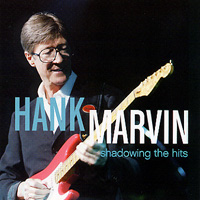
HM: I don’t know a great deal about it Robert. My manager Brian
Goode was involved. He used to be the Shadows manager, then the Shadows
didn’t exist and he was my manager subsequently and has acted
in the capacity I suppose of the Shadows manager for this project
we’re discussing. When the tour was being set up, obviously everyone
thought it would be good to try to sort of immortalize it on DVD or
something and Eagle was the company in particular who expressed interest
in doing it. I know very little about the ins and outs and how they
were approached or if they approached Brian. I know very little about
that so I’m very glad that they did though because they approached
it in a very professional way and the funny thing was, a little coincidental
thing, the director of the DVD, Aubrey Powell, we first met him and
his partner when they used to design sleeve covers for the British
record industry in the early ‘70s. And they did some huge covers
at the time. When we had the Marvin, Welch & Farrar set up—with
Bruce, John Farrar and myself...well, the two Marvin Welch & Farrar
albums and the Marvin Farrar album, were all designed by them. And
they were two young guys, very arty, very hippie with the long hair
and the beards. It was called Hipgnosis, the company, and the two
guys were Storm and Po and Po was Aubrey Powell, the director of this
movie so...He looks a lot different now. He looks like a schoolmaster
or something now. Very well presented. (laughter) Instead of his hippie
youth. (laughter)
RS: You mentioned the nostalgia factor. Of the hundreds of Shadows
tracks, how did The Shadows come up with the set list?
HM: When you think of a tour of this nature, if you’re putting
a band back together that hasn’t worked for 14 years together,
which was the case with The Shadows, and it’s a farewell tour
you have to look obviously at, or try to consider what the fans would
want you to do. Obviously they want to come and hear the hits, they
want to come to hear favorite album tracks and there have been certain
surveys taken by different little fan bodies and so forth over the
years and you can see a little list of the numbers that come out on
the top of this list. Overall, these are the ones that the fans rate
very highly and would like to hear or whatever. And so with those
thoughts in mind, that’s what we did. Plus, obviously we did
a little selection of stuff we’d written for Cliff. They’re
all huge hits so everyone knows them and loves them and for the first
time probably seeing us as The Shadows performing those songs without
Cliff. Songs that we’d written plus the Marvin Welch & Farrar
stuff as I said, so really that was the thinking behind it. Not to
try to be clever and introduce new material that might be terrific
and may go down very well, may also be terrific musically but the
fans go, ‘what’re they doing that for? I wish they’d
play such and such.’ ‘Cause in reality, if you think about
it, if you haven’t seen your favorite band or one of them, for
say fourteen or fifteen years and they reformed to do a tour, literally
how would we think Robert, if you were going or if I was going? We’d
think, ‘oh I hope they’re gonna do all this, that’,
and you think of all the hits and the favorite tracks that everyone
loves. That’s what you want to hear. You’re not really interested
in them come up with something new and obscure. Because this is, as
you perceive it, your only opportunity to see and hear them perform
ever again. And so you want to hear all the favorites or as many as
you can. That seems to be pretty common with people you talk to, to
fans. Or when I do anyway. Maybe they’re feeding me the wrong
information (laughter) but that’s the impression I get. I think
because of that, you go out and give people what they want in that
sense, they certainly do appreciate it. They don’t want to be
educated on a tour like this. They just want you to give them what
they want and that was the thinking behind this.
RS: Interesting to note on the Final Tour CD, in addition to
the big Shadows hits, there’s actually four songs from the 1961
self-titled Shadows studio Lp, “Sleepwalk”, “Shadoogie”,
“Gonzales” and “Nivram”, which is proof of the
longevity of even the earliest studio songs, aside from the hits.
HM: It’s interesting that with “Gonzales” for example.
I did “Gonzales” with my band Robert a few tours ago, my
penultimate tour. Strange thing, The Shadows had never ever done that
live. We found out through one of these fan sort of zines, that came
out very, very high up the list of Shadows favorite tracks. And I
thought at the time, ‘hey, I’ll have listen again, this
could be a real fun thing to do on stage.’ ‘Cause it just
roars along with so much energy. And so I started doing it with my
band and when it came to this tour, I said to the guys, ‘look,
it was high on the list, and let’s have a crack.’ They all
liked it, and so we did it. It’s funny how things can happen
like that. For some reason, bands can sort of ignore certain tunes
for whatever reason. I think, over the years we perhaps thought it
was a bit, I don’t know, basic maybe. Maybe as The Shads, as
we tried to get more sophisticated and more melodic and so forth,
that some of those sort of more earthy pieces of music got left by
the wayside. That can happen I think, but it’s a good thing to
listen to the fans I think, particularly when you’re doing a
show of this type, because it’s all about nostalgia really. It’s
not about starting a new career and introducing new material, it’s
really just giving people what they want to hear. And in a way, it’s
a fun thing for us to do it because the material was all connected
with us. Everything we did is material that was either stuff that
we had hits with, or from hit albums, maybe a favorite b-side, or
whatever. It was all material connected with us that we had recorded
either as ourselves or Marvin Welch & Farrar or with Cliff and
it was quite a lot of fun for all of us to do that and just give a
little sort of potted history of what we’d done over the years.
And it was quite nice for us to do it and also very enjoyable.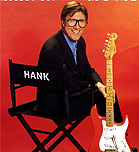
RS: Even though you’re primarily known as a guitar player in
The Shadows, you’re also a great singer-songwriter. I was glad
the Final Tour CD and DVD features some great vocal tracks
like “Lady Of The Morning” and one of my favorite Shads
songs, “Don’t Make My Baby Blue.”
HM: Yeah, do you know that song, Robert? I don’t know if you’re
aware...do you remember Frankie Laine, the great American pop singer
of the ‘50s? Actually, someone played it to Bruce in early ‘64
or something. It could have been ‘64 / ‘65. And he came
over and said, ‘what do you think of this song?’ And it
was Frankie Laine doing a version of this song, “Don’t Make
My Baby Blue.” And we thought, ‘that’s good.’
So we had a crack at recording it. We recorded it in, I think it was
in Portugal, we were sort of doing some recordings there and that
was one of the tracks that we recorded. The interesting thing about
it was, we decided to release it as a single and it was a hit. It
was a top 5 hit. But, when it was in the charts I had to go to Abbey
Road studios for something, where we recorded of course for EMI and
The Beatles were doing something and I was talking to George. And
he said, ‘Oh, I love the new record.’ This was “Don’t
Make My Baby Blue.” He said, ‘You know what? Look, you guys
have always been good singers. What you should do is, honestly forget
the instrumentals. Concentrate on vocals.’ Sadly, we didn’t
listen to him. (laughter) We continued, after that with more instrumentals,
which of course, were beginning to get less and less appealing in
the broad sense to the commercial market, you know, the fashion was
going. We were still tickling the charts but we weren’t getting
the big hits anymore. I think he was right. We should have probably
used “Don’t Make My Baby Blue” as a launching pad to
go off into a sort of vocal / instrumental direction. But there you
go, it’s hindsight Robert, isn’t it?
Click
here to read more

